Travelers 2013 Annual Report Download - page 39
Download and view the complete annual report
Please find page 39 of the 2013 Travelers annual report below. You can navigate through the pages in the report by either clicking on the pages listed below, or by using the keyword search tool below to find specific information within the annual report.-
 1
1 -
 2
2 -
 3
3 -
 4
4 -
 5
5 -
 6
6 -
 7
7 -
 8
8 -
 9
9 -
 10
10 -
 11
11 -
 12
12 -
 13
13 -
 14
14 -
 15
15 -
 16
16 -
 17
17 -
 18
18 -
 19
19 -
 20
20 -
 21
21 -
 22
22 -
 23
23 -
 24
24 -
 25
25 -
 26
26 -
 27
27 -
 28
28 -
 29
29 -
 30
30 -
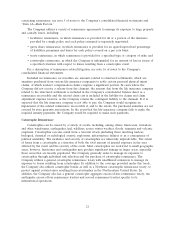 31
31 -
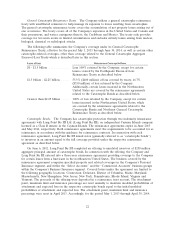 32
32 -
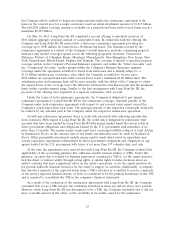 33
33 -
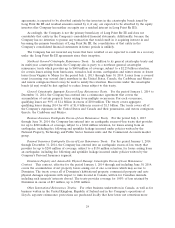 34
34 -
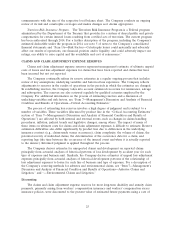 35
35 -
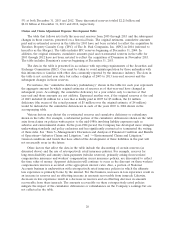 36
36 -
 37
37 -
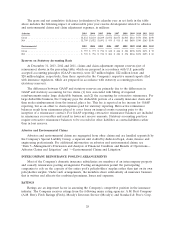 38
38 -
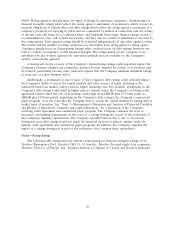 39
39 -
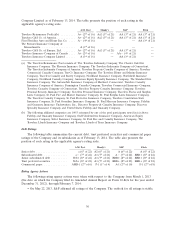 40
40 -
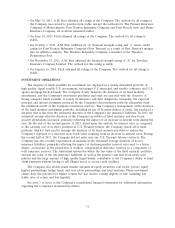 41
41 -
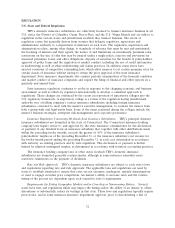 42
42 -
 43
43 -
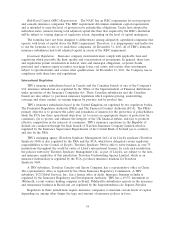 44
44 -
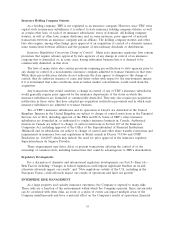 45
45 -
 46
46 -
 47
47 -
 48
48 -
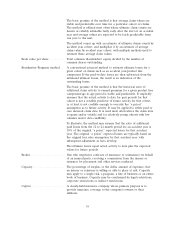 49
49 -
 50
50 -
 51
51 -
 52
52 -
 53
53 -
 54
54 -
 55
55 -
 56
56 -
 57
57 -
 58
58 -
 59
59 -
 60
60 -
 61
61 -
 62
62 -
 63
63 -
 64
64 -
 65
65 -
 66
66 -
 67
67 -
 68
68 -
 69
69 -
 70
70 -
 71
71 -
 72
72 -
 73
73 -
 74
74 -
 75
75 -
 76
76 -
 77
77 -
 78
78 -
 79
79 -
 80
80 -
 81
81 -
 82
82 -
 83
83 -
 84
84 -
 85
85 -
 86
86 -
 87
87 -
 88
88 -
 89
89 -
 90
90 -
 91
91 -
 92
92 -
 93
93 -
 94
94 -
 95
95 -
 96
96 -
 97
97 -
 98
98 -
 99
99 -
 100
100 -
 101
101 -
 102
102 -
 103
103 -
 104
104 -
 105
105 -
 106
106 -
 107
107 -
 108
108 -
 109
109 -
 110
110 -
 111
111 -
 112
112 -
 113
113 -
 114
114 -
 115
115 -
 116
116 -
 117
117 -
 118
118 -
 119
119 -
 120
120 -
 121
121 -
 122
122 -
 123
123 -
 124
124 -
 125
125 -
 126
126 -
 127
127 -
 128
128 -
 129
129 -
 130
130 -
 131
131 -
 132
132 -
 133
133 -
 134
134 -
 135
135 -
 136
136 -
 137
137 -
 138
138 -
 139
139 -
 140
140 -
 141
141 -
 142
142 -
 143
143 -
 144
144 -
 145
145 -
 146
146 -
 147
147 -
 148
148 -
 149
149 -
 150
150 -
 151
151 -
 152
152 -
 153
153 -
 154
154 -
 155
155 -
 156
156 -
 157
157 -
 158
158 -
 159
159 -
 160
160 -
 161
161 -
 162
162 -
 163
163 -
 164
164 -
 165
165 -
 166
166 -
 167
167 -
 168
168 -
 169
169 -
 170
170 -
 171
171 -
 172
172 -
 173
173 -
 174
174 -
 175
175 -
 176
176 -
 177
177 -
 178
178 -
 179
179 -
 180
180 -
 181
181 -
 182
182 -
 183
183 -
 184
184 -
 185
185 -
 186
186 -
 187
187 -
 188
188 -
 189
189 -
 190
190 -
 191
191 -
 192
192 -
 193
193 -
 194
194 -
 195
195 -
 196
196 -
 197
197 -
 198
198 -
 199
199 -
 200
200 -
 201
201 -
 202
202 -
 203
203 -
 204
204 -
 205
205 -
 206
206 -
 207
207 -
 208
208 -
 209
209 -
 210
210 -
 211
211 -
 212
212 -
 213
213 -
 214
214 -
 215
215 -
 216
216 -
 217
217 -
 218
218 -
 219
219 -
 220
220 -
 221
221 -
 222
222 -
 223
223 -
 224
224 -
 225
225 -
 226
226 -
 227
227 -
 228
228 -
 229
229 -
 230
230 -
 231
231 -
 232
232 -
 233
233 -
 234
234 -
 235
235 -
 236
236 -
 237
237 -
 238
238 -
 239
239 -
 240
240 -
 241
241 -
 242
242 -
 243
243 -
 244
244 -
 245
245 -
 246
246 -
 247
247 -
 248
248 -
 249
249 -
 250
250 -
 251
251 -
 252
252 -
 253
253 -
 254
254 -
 255
255 -
 256
256 -
 257
257 -
 258
258 -
 259
259 -
 260
260 -
 261
261 -
 262
262 -
 263
263 -
 264
264 -
 265
265 -
 266
266 -
 267
267 -
 268
268 -
 269
269 -
 270
270 -
 271
271 -
 272
272 -
 273
273 -
 274
274 -
 275
275 -
 276
276 -
 277
277 -
 278
278 -
 279
279 -
 280
280 -
 281
281 -
 282
282 -
 283
283 -
 284
284 -
 285
285 -
 286
286 -
 287
287 -
 288
288 -
 289
289 -
 290
290 -
 291
291 -
 292
292 -
 293
293 -
 294
294 -
 295
295 -
 296
296 -
 297
297 -
 298
298 -
 299
299 -
 300
300 -
 301
301 -
 302
302 -
 303
303 -
 304
304
 |
 |
(S&P). Rating agencies typically issue two types of ratings for insurance companies: claims-paying (or
financial strength) ratings which reflect the rating agency’s assessment of an insurer’s ability to meet its
financial obligations to policyholders and debt ratings which reflect the rating agency’s assessment of a
company’s prospects for repaying its debts and are considered by lenders in connection with the setting
of interest rates and terms for a company’s short- and long-term borrowings. Agency ratings are not a
recommendation to buy, sell or hold any security, and they may be revised or withdrawn at any time by
the rating agency. Each agency’s rating should be evaluated independently of any other agency’s rating.
The system and the number of rating categories can vary widely from rating agency to rating agency.
Customers usually focus on claims-paying ratings, while creditors focus on debt ratings. Investors use
both to evaluate a company’s overall financial strength. The ratings issued on the Company or its
subsidiaries by any of these agencies are announced publicly and are available on the Company’s
website and from the agencies.
A downgrade in one or more of the Company’s claims-paying ratings could negatively impact the
Company’s business volumes and competitive position because demand for certain of its products may
be reduced, particularly because some customers require that the Company maintain minimum ratings
to enter into or renew business with it.
Additionally, a downgrade in one or more of the Company’s debt ratings could adversely impact
the Company’s ability to access the capital markets and other sources of funds, including in the
syndicated bank loan market, and/or result in higher financing costs. For example, downgrades in the
Company’s debt ratings could result in higher interest expense under the Company’s revolving credit
agreement (under which the cost of borrowing could range from LIBOR plus 87.5 basis points to
LIBOR plus 150 basis points, depending on the Company’s debt ratings), the Company’s commercial
paper program, or in the event that the Company were to access the capital markets by issuing debt or
similar types of securities. See ‘‘Item 7—Management’s Discussion and Analysis of Financial Condition
and Results of Operations—Liquidity and Capital Resources’’ for a discussion of the Company’s
revolving credit agreement and commercial paper program. The Company considers the level of
increased cash funding requirements in the event of a ratings downgrade as part of the evaluation of
the Company’s liquidity requirements. The Company currently believes that a one- to two-notch
downgrade in its debt ratings would not result in a material increase in interest expense under its
existing credit agreement and commercial paper programs. In addition, the Company considers the
impact of a ratings downgrade as part of the evaluation of its common share repurchases.
Claims—Paying Ratings
The following table summarizes the current claims-paying (or financial strength) ratings of the
Travelers Reinsurance Pool, Travelers C&S Co. of America, Travelers Personal single state companies,
Travelers C&S Co. of Europe, Ltd., Travelers Insurance Company of Canada and Travelers Insurance
29
